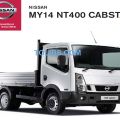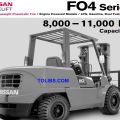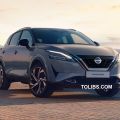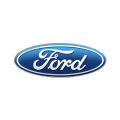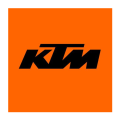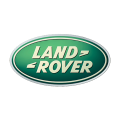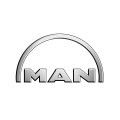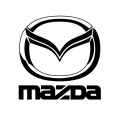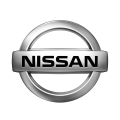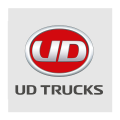Nissan JUKE Owner’s manuals
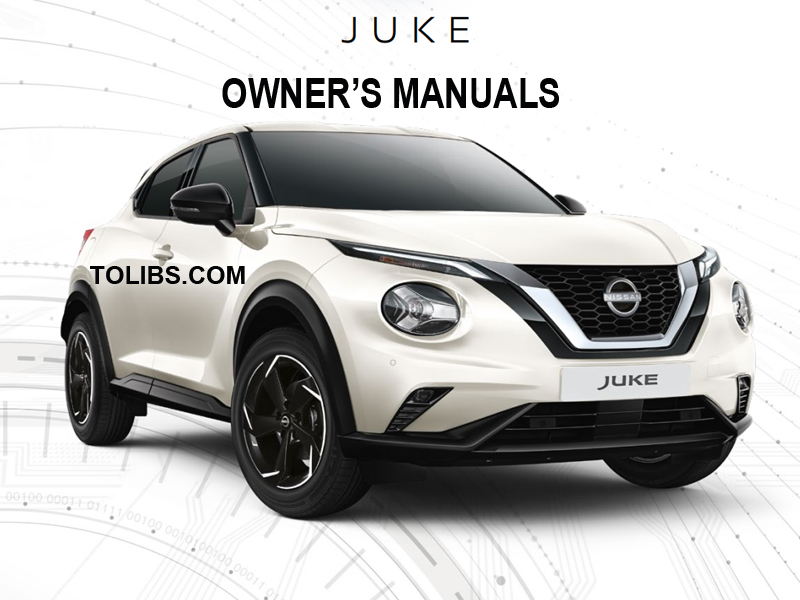
Nissan Juke with Hybrid technology Bold, electrified and powerful
Introducing the electrified Nissan Juke, the Hybrid Crossover that puts the adventure back in urban driving. At first sight, its bold design is meant to turn heads. Once inside, you’ll be captivated by the premium details and our advanced technologies. Press the accelerator pedal and feel the smoothness of the electric motor, as well as the powerful petrol engine for a responsive ride.
Cutting edge design from every angle
Four doors, one irresistible design. From the V-motion grille to the 3D Boomerang lights in the rear, the Nissan Juke Hybrid is designed to be bold. Its sharp lines and distinctive floating roof, inspired by the iconic Nissan GT-R and Z.
Thoughtful design
The Nissan Juke’s interior is designed around you – with high quality finishes, ergonomic controls and ambient lighting designed to put you in the mood for driving. The intuitive, layered cockpit design helps to keep you in control and ready to enjoy the drive.
Hybrid Powertrain
Yes, a hybrid can be thrilling. This hybrid powertrain automatically selects the most efficient power source between the electric motor, the petrol engine or a combination of the two, for optimal performance and efficiency. Juke Hybrid runs predominantly in electric mode for city driving, with immediate reactiveness and smoothness to throttle inputs. Its cabin space is quiet even on busy streets.
Petrol Engine
In addition to the hybrid powertrain, the Nissan Juke is also available with 1.0-litre lightweight internal combustion engine. The electronically charged turbocharger and reduced friction design gives smooth and responsive power, while the ECO mode delivers greater efficiency. Available with manual or DCT automatic transmission.
Confidence at every turn
With Nissan ProPILOT Assist*, you’re never on your own. Standard from DCT Tekna and an option on DCT N-Connecta, it works in the background, helping you to keep an eye on the road. You just drive the way you always drive, but know that the Nissan Juke is ready to help with braking, steering or accelerating to help keep you safe, on track and in control when it really counts.
NISSAN TOWING GUIDE
NISSAN Towing Guide provides information for currently available NISSAN vehicles. This publication will be amended as new vehicles are introduced.
SAFETY IS PRIORITY ONE
Obviously, your first concern should be safety. Your vehicle was designed to be used primarily to carry passengers and cargo. Always remember that towing a trailer places additional loads on your vehicle’s engine, drivetrain, suspension, steering, braking, and other systems. Therefore, be certain that your vehicle can meet the demands of the towing application you have in mind.
Rent or purchase towing equipment that complies with established industry standards and state and federal safety regulations. Reinforced tow hitches designed especially for certain NISSAN vehicles are available from your NISSAN dealer. Hitches for other NISSAN models If Nissan recommends towing with that vehicle - should be bought from and installed by a professional supplier of towing equipment. Carefully review all information and literature provided with any hitch you purchase for safety and proper use information.
Finally, it is important to follow the towing capacity limit set for your specific vehicle, and to ensure that your vehicle is in top mechanical condition, especially the tires, brakes, suspension, and engine cooling system. See your vehicle owner’s manual for details.
NEVER EXCEED THE ESTABLISHED TOWING CAPACITY
Towing capacities vary from vehicle to vehicle. See the towing information in your vehicle owner’s manual to confirm whether your NISSAN vehicle can be used to tow and if so, what its towing capacity rating is. Use this data to help select the proper NISSAN vehicle to meet your anticipated towing needs, and refer to it when renting a trailer or other piece of towing equipment.
EQUIP YOUR NISSAN FOR TOWING
The frequency and type of towing dictate the manner in which you equip your vehicle. If you plan to tow often, for either recreation or work, select the engine size, transmission type, suspension, and towing capacity that are best suited to your requirements. This guide can help you select that equipment. If, on the other hand, your towing will be infrequent, choose the NISSAN vehicle and equipment that best meets your day-to-day needs. Be careful not to exceed the towing capacity on those few occasions when you do tow.
READ THIS GUIDE BEFORE YOU TOW
This guide was designed to provide an overview of safe towing practices. Here, you will find information on towing equipment, safety, proper loading and driving techniques, towing tips, and much more. It is also a good idea to discuss your towing requirements with either your NISSAN dealer or a professional supplier of towing equipment before you equip your NISSAN vehicle for towing. Finally, there are state and local laws on towing that you should review to ensure compliance with all regulations.
TOWING EQUIPMENT RENTING
The first thing to keep in mind when renting any type of tow equipment, trailer, or tow dolly, is to rent only from professional companies that specialize in towing and towing equipment. More than likely, specialized companies hire professional staff that can assist you in selecting and installing the proper towing equipment for your NISSAN vehicle.
When renting, make sure you have your vehicle owner’s manual on hand so that you can reference the towing capacities for your specific vehicle. Make certain that the tow equipment and components you rent does not exceed your vehicles maximum towing capacity. Make sure that any related towing equipment you rent has the proper weight class rating for your maximum intended towed load weight, and do not exceed the maximum Gross Combined Weight Rating.
While you are there, ask questions. How much does the empty trailer weigh? How much weight will the trailer hold? What is the trailer’s tongue load? What type of brakes is it equipped with (if any)? All of these factors have an effect on whether your NISSAN vehicle is capable of safely pulling that type of trailer, dolly, or tow equipment.
Make certain that the trailer stoplights, taillights, turn signals, and brakes (if equipped) are connected and operating correctly, and all safety equipment is properly installed. Check the safety chains/cables, tie-downs, etc.
For safer operation, carefully inspect the condition of the trailer and towing equipment. Specifically, check to make sure the tires are not worn excessively and are properly inflated. Make sure there are not any broken welds, missing bolts, and that the hitch components are not damaged. Towing safety should be a high priority when choosing and renting towing equipment, including hitches.
PURCHASING
If you are buying a travel or boat trailer, besure that your NISSAN vehicle has the towing capacity to pull it. Refer to your vehicle owner’s manual for detailed information regarding the towing capacity of your specific vehicle. Your vehicle owner’s manual should ALWAYS be referenced before making any towing decisions.
Naturally, you will want to select the towing and safety equipment that adheres to your state’s and federal safety regulations. Moreover, if you plan to tow often, consider convenience. Quick-disconnect trailer light connectors and ratchet-type tie-downs, for example, make the job go faster and easier and are usually worth the extra small investment.Purchase towing items such as hitches and hitch balls only from your NISSAN dealer or a professional supplier of towing equipment.
If you are intending to use your vehicle to tow a trailer you already own, you must ensure that your loaded trailer remains well within your vehicle's towing capacity as specified in the vehicle owner's manual. In addition, you shouldpurchase the right type, style, and class* of hitch and towing equipment to properly adapt the trailer to your vehicle.
TYPES OF EQUIPMENT
Towing requires a variety of equipment, and,depending upon the application, there can be several types or styles of each piece of equipment. Working with your NISSAN dealer or a professional supplier of towing equipment, it should be relatively simple to determine the proper type of equipment for your specific vehicle given the intended application. This section explains the most common pieces of towing equipment available.
HITCHES
Whichever type of hitch you use, it should be firmly bolted to your vehicle, and should be of the appropriate weight class for the trailer, tow dollies, or towing equipment you intend to tow.In addition, keep the following in mind:
- Installing an aftermarket hitch may affect the rear crash performance of your vehicle.Changing the crash performance of a vehicle could lead to more severe vehicle damage,personal injury or death in a crash. Be sure that the hitch does not interfere in any way with the vehicle’s impact-absorbing bumper.
- Never attach a hitch or towing device to the vehicle bumper. This may affect the operation of the impact-absorbing bumper.Useonlya permanent-type hitch properly attached to the vehicle to help avoid personal injury or property damage.
- Regularly check to see that all hitch-mounting bolts are securely fastened to ensurethe hitch will not come loose, and remains properly attached to the vehicle to helpavoid personal injury or property damage.
- If you install a hitch yourself, remember thatit must be securely attached to the frame or underbody, according to the manufacturer’s instructions.Never attach a hitch or towing device to the vehicle axle housing. Thismay damage the housing, wheel bearings,wheels, or tires.
Hitch Types Bumper Hitch
This is a special reinforced bumper designed to accommodate a hitch ball. The bumper must support the trailer Tongue weight all by itself. Fixed ball mount hitches are normally used for light-to-medium-duty towing.
Receiver Hitch
A receiver hitch is bolted directly to the vehicle structure for added strength and durability. NISSAN bolt-on receiver hitches are designed for use with NISSAN vehicles, and include the necessary reinforcements, with ample clearance around bumpers, and frame members, etc. These hitches allow for the removal of the ball mount when not towing.
Weight Distributing Hitch System
This type of system uses a “load-leveling” or“equalizing” hitch. The weight-distributing feature helps shift trailer tongue weight toall axles of the tow vehicle and all trailer tires.
For Armada, Frontier, Pathfinder, Titan,and Nissan NV vehicles, a weight-distributing hitch ball mount (Class IV) is recommendedif you plan to tow trailers with a maximum weight over 5,000 lbs. This ball mount includes a 25/16” hitch ball and is available through your NISSAN dealer.
NOTE: A weight-distributing hitch systemmay affect the operation of trailer surge brakes. If you are considering use of a weight-distributing hitch system with a surge brake-equipped trailer, check with the surge brake, hitch, ortrailer manufacturer to determine if and how this can be done. Follow the instructions provided by the equipment manufacturer for installing and using the weight-distributing hitch system.
5th Wheel or Gooseneck Hitch –Mounted in the bed of a pick-up and designed for heavy-duty applications, these types of hitches are not available from NISSAN but can be purchased from a professional supplier of towing equipment. At this time, Titan is the only NISSAN vehicle approved for 5th wheel and gooseneck trailer towing.
A 5th wheel or gooseneck hitch is usually installed and adjusted to meet the requirements of a particular trailer, but two basic rules hold true in every case. First,the hitch should be mounted a minimum2 inches forward of the rear axle centerline. Second, it should be securely attached directly to the truck frame. Only,professionals should do this installation.

